B Vitamins for Mood and Nerve Health in Parkinson’s Patients
Introduction
Living with Parkinson’s disease means more than managing tremors, stiffness, or movement changes. It’s also about navigating the invisible — the subtle shifts in mood, energy, and nerve function that ripple through everyday life. Many people with Parkinson’s describe feeling emotionally drained, foggy, or simply “not themselves.”
While medications play a crucial role in controlling symptoms, nutrition forms the foundation that supports brain chemistry, cellular repair, and emotional stability. Among all nutrients, the B vitamins stand out as some of the most vital for both mood and nerve health.
These water-soluble nutrients don’t just help the body convert food into energy — they are deeply involved in neurotransmitter synthesis, myelin maintenance, and the overall integrity of the nervous system. For people with Parkinson’s, who experience both dopamine depletion and nervous system stress, the B vitamin family can make a powerful difference.
Understanding how B vitamins influence emotional balance and nerve protection opens the door to a more holistic approach to living well with Parkinson’s. 🌼
Looking for supplements for This? Click here.
🧠 The Brain-Nerve Connection in Parkinson’s
Parkinson’s disease is primarily known as a neurological condition, yet its effects extend to nearly every system of the body. The loss of dopamine-producing neurons in the substantia nigra affects not only motor control but also mood, motivation, digestion, and sleep.
Over time, dopamine deficiency contributes to emotional challenges such as depression, anxiety, and apathy. At the same time, nerve fibers throughout the body may undergo oxidative stress, leading to tingling sensations, muscle cramps, or neuropathy.
The nervous system operates much like an intricate electrical network. For these “wires” to function properly, they must be insulated by a protective sheath called myelin. The health of this insulation depends heavily on specific B vitamins — especially B12, B6, and folate (B9).
Deficiency in these nutrients can impair nerve communication and heighten mood disturbances, even in those who are otherwise managing Parkinson’s motor symptoms well.
🌿 Why B Vitamins Are Especially Important for People with Parkinson’s
Several factors make B vitamin support particularly critical for individuals with Parkinson’s.
First, many Parkinson’s medications, including levodopa (L-DOPA), can alter the body’s metabolism of B vitamins. Over time, levodopa increases homocysteine — a byproduct of dopamine synthesis — which, when elevated, becomes toxic to nerves and blood vessels.
Normally, the body neutralizes homocysteine through a process that requires vitamin B12, folate, and B6. But when those vitamins are insufficient, homocysteine builds up, causing oxidative stress, cognitive fatigue, and even worsening mood symptoms.
Secondly, gastrointestinal changes common in Parkinson’s, such as reduced stomach acid or slower digestion, can interfere with nutrient absorption — especially vitamin B12. This can quietly lead to deficiency even in those eating balanced diets.
Finally, chronic stress, fatigue, and medication load all increase the body’s demand for B vitamins. These nutrients are water-soluble and easily depleted, particularly when the nervous system is under constant strain.
Together, these factors create a perfect storm where B vitamin replenishment becomes not optional, but essential.
💊 Vitamin B12: The Nerve Protector
Vitamin B12, or cobalamin, is one of the most crucial nutrients for nerve integrity and emotional health. It supports the production of myelin — the fatty sheath that protects nerve fibers and allows smooth communication between brain and body.
Deficiency in B12 can cause symptoms that mimic or worsen Parkinson’s: numbness, tingling, balance problems, fatigue, and even cognitive decline. It can also lead to depression, irritability, and memory issues.
Research has shown that low B12 levels are surprisingly common among Parkinson’s patients. One study published in Movement Disorders found that those with the lowest B12 levels experienced faster disease progression and greater mobility issues.
B12 also helps regulate homocysteine, the neurotoxic amino acid mentioned earlier. By converting homocysteine into beneficial compounds like methionine, B12 supports detoxification and protects both the vascular and nervous systems.
There are several forms of B12, but methylcobalamin is particularly valuable for the brain. Unlike the synthetic cyanocobalamin form, methylcobalamin participates directly in methylation — a process crucial for DNA repair, neurotransmitter synthesis, and mood balance.
Supplementing with methylcobalamin can improve nerve conduction, reduce neuropathy, and enhance focus and energy in people with Parkinson’s, especially when used alongside other B vitamins for synergistic effect.
🌸 Folate (Vitamin B9): The Mood Stabilizer
Folate, or vitamin B9, is another critical nutrient for emotional regulation and nerve repair. It works closely with B12 to recycle homocysteine and to generate SAMe (S-adenosylmethionine) — a molecule that supports neurotransmitter production and mood stabilization.
Low folate levels have been consistently linked to depression, cognitive fog, and poor stress resilience. In Parkinson’s, where the brain is already struggling with dopamine imbalances, folate deficiency can amplify emotional instability.
In addition, folate is essential for neurogenesis — the creation of new brain cells. Studies show that sufficient folate levels correlate with better cognitive performance and slower age-related decline.
Many older adults, however, have difficulty converting dietary folate into its active form. That’s why methylfolate (L-5-MTHF) supplements are often recommended; they bypass the conversion process and can be used directly by the brain.
By combining methylfolate with B12, patients often notice sharper cognition, steadier mood, and more balanced energy. This biochemical partnership acts almost like a repair crew for the nervous system, patching communication gaps and enhancing resilience.
🌻 Vitamin B6: The Neurotransmitter Assistant
Vitamin B6 (pyridoxine) is one of the most versatile members of the B family. It assists in more than 100 enzymatic reactions, many of which are directly related to brain chemistry and mood regulation.
B6 is essential for converting the amino acid tryptophan into serotonin — the “feel-good” neurotransmitter that regulates mood, sleep, and appetite. It also plays a role in producing dopamine, norepinephrine, and GABA, all of which influence emotional balance and nervous system calm.
For people with Parkinson’s, vitamin B6 takes on additional significance because it supports the metabolism of levodopa. However, dosage timing matters. High doses of B6 can interfere with the conversion of levodopa to dopamine in the brain if not properly balanced. Therefore, it’s important to take B6 supplements under professional guidance to complement — not compete with — medication.
Beyond mood, B6 helps reduce inflammation and maintain healthy immune function. Its role in regulating homocysteine makes it a cornerstone in any nerve-protective plan.
Looking for supplements for This? Click here.
💚 The B-Complex Synergy
While each B vitamin plays unique roles, they rarely work in isolation. In fact, they function best as a team.
Vitamin B1 (thiamine) aids in nerve impulse transmission and may improve motor symptoms in some Parkinson’s patients. High-dose thiamine therapy has shown promise in small studies, potentially by improving mitochondrial energy metabolism in neurons.
Vitamin B2 (riboflavin) supports mitochondrial energy production and helps regenerate antioxidants like glutathione, which protects dopamine neurons from oxidative damage.
Vitamin B3 (niacin) participates in NAD+ synthesis — an essential cofactor for cellular repair and energy generation. Some research suggests niacin may help reduce fatigue and improve mitochondrial health in Parkinson’s.
Vitamin B5 (pantothenic acid) supports adrenal balance and the production of acetylcholine, a neurotransmitter vital for memory and muscle coordination.
Taken together, the B-complex vitamins act as a unified support system for the nervous system, helping maintain cellular energy, regulate mood, and buffer the body from stress.
This synergy is why comprehensive B-complex supplements — rather than isolated single vitamins — are often recommended. The brain and nerves respond better to harmony than to isolated interventions.
🌿 B Vitamins and Depression in Parkinson’s
Depression affects nearly half of all people with Parkinson’s at some stage of their condition. It’s not just a psychological response to diagnosis — it’s a biological consequence of neurochemical imbalance and nutrient depletion.
Low B-vitamin status is strongly associated with depressive symptoms in both the general population and Parkinson’s patients. Deficiencies in B6, B12, and folate can lead to reduced serotonin, dopamine, and norepinephrine — the same neurotransmitters targeted by antidepressant medications.
Several clinical trials have shown that correcting B-vitamin deficiencies can significantly improve mood and reduce anxiety. In one study, older adults with depression responded better to standard treatment when given B-vitamin supplementation, particularly methylfolate.
B vitamins also modulate the stress response through the hypothalamic-pituitary-adrenal (HPA) axis. Adequate levels reduce cortisol spikes and promote emotional stability, preventing burnout in the face of chronic illness.
For people with Parkinson’s, this emotional steadiness translates into improved quality of life — more patience with daily routines, greater clarity, and a gentler relationship with one’s own body.
🔋 Energy and Cognitive Function
Fatigue is another underappreciated symptom in Parkinson’s. Unlike normal tiredness, it’s often a deep, neurological exhaustion caused by mitochondrial dysfunction, oxidative stress, and medication effects.
B vitamins serve as the spark plugs of cellular metabolism. They enable the Krebs cycle — the body’s process for converting nutrients into usable energy. When B vitamins are lacking, the entire energy chain falters, leading to brain fog, lethargy, and poor concentration.
Supplementation can help restore this energy balance. Many patients report that after several weeks of consistent B-vitamin intake, mental sharpness and motivation begin to improve.
B vitamins also protect against cognitive decline. Studies have linked low B12 and folate with increased risk of dementia, while supplementation appears to slow brain atrophy in older adults. For Parkinson’s patients already vulnerable to cognitive changes, maintaining optimal B-vitamin levels can provide crucial protection.
The brain is a high-energy organ, consuming about 20% of the body’s fuel. B vitamins ensure that energy reaches where it’s needed most — sustaining neurons, preserving clarity, and maintaining emotional resilience.
🌼 Dietary Sources of B Vitamins
While supplements can be valuable, food remains the most natural and synergistic source of B vitamins. Whole, unprocessed foods provide a matrix of cofactors that enhance absorption and balance.
Vitamin B12 is found primarily in animal-based products such as fish, eggs, dairy, and meat. Plant-based eaters must rely on fortified foods or supplements, as vegan diets naturally lack B12.
Folate is abundant in leafy greens, asparagus, lentils, and avocado. Vitamin B6 can be obtained from poultry, bananas, potatoes, and chickpeas.
Thiamine, riboflavin, and niacin are found in whole grains, nuts, and seeds, while pantothenic acid appears in nearly all unprocessed foods.
Cooking methods can influence vitamin retention, since B vitamins are water-soluble and sensitive to heat. Steaming or lightly sautéing vegetables preserves more nutrients than boiling.
For individuals with digestive issues or reduced absorption, methylated or sublingual forms of B12 and folate can bypass the gut and deliver nutrients directly into circulation.
🌙 Restoring Balance: Supplementation in Practice
A high-quality B-complex supplement can provide comprehensive support for Parkinson’s patients who face multiple nutrient demands. When choosing one, it’s best to select a formula containing methylated forms (such as methylcobalamin and methylfolate) to ensure optimal absorption and brain bioavailability.
Because the nervous system functions continuously, B vitamins should be taken daily for steady nourishment. Morning is often ideal, as they naturally boost energy and metabolism.
For those taking levodopa, timing may matter. Taking B6 supplements at the same time as medication can interfere with its conversion, so it’s generally best to separate them by a few hours.
As with any supplement, coordination with a healthcare provider is crucial — especially since Parkinson’s treatments can interact with metabolism and nutrient levels in complex ways. Blood tests to monitor B12, folate, and homocysteine provide helpful guidance for individualized dosing.
With patience and consistency, B vitamins gradually rebuild the body’s biochemical foundation. Many people describe a subtle but powerful shift: more grounded mood, sharper thinking, and smoother daily energy.
🌸 Beyond Biochemistry: The Emotional Power of Nutritional Repair
When living with a condition like Parkinson’s, it’s easy to feel as though one’s emotional and cognitive health are beyond control. But addressing underlying nutrient deficiencies can restore a sense of agency — and even hope.
B vitamins nourish more than neurons. They nurture the mind’s ability to adapt, focus, and feel. When the nervous system receives proper support, emotional resilience follows naturally.
This doesn’t mean that vitamins replace therapy, medication, or self-care. Rather, they create the biochemical stability that allows those other interventions to work more effectively. A brain well-fed in its essentials is more receptive to joy, mindfulness, and healing.
Imagine the nervous system as a symphony. Parkinson’s may change the rhythm, but B vitamins help tune the instruments — ensuring that harmony, though altered, remains possible.
🌞 The Takeaway
B vitamins are the unsung heroes of nervous system health. In Parkinson’s disease, where the body’s energy and communication systems are under immense pressure, these nutrients become indispensable.
They repair, protect, and energize — supporting both the physical integrity of neurons and the emotional strength of the mind. By balancing homocysteine, aiding neurotransmitter synthesis, and restoring energy metabolism, B vitamins can help counter fatigue, depression, and cognitive decline.
While supplementation should always be tailored to the individual, ensuring adequate intake of B12, B6, and folate can profoundly improve how one feels and functions day to day.
In a condition that so often feels depleting, these small biochemical allies offer renewal — from the inside out. 🌿✨
Looking for online therapy ? Click Here.
📚 References
Christine, C. W., & Auinger, P. (2012). Vitamin B12 and progression of Parkinson’s disease. Movement Disorders, 27(1), 111–115.
Mischley, L. K., Lau, R. C., & Bennett, R. D. (2017). Nutritional and botanical approaches to Parkinson’s disease. Integrative Medicine, 16(4), 30–36.
McCaddon, A., & Hudson, P. (2010). Homocysteine and cognitive decline. Clinical Chemistry and Laboratory Medicine, 48(4), 387–393.
Reynolds, E. (2006). Vitamin B12, folic acid, and the nervous system. Lancet Neurology, 5(11), 949–960.
Morris, M. S., et al. (2010). Folate, vitamin B12, and depression. American Journal of Clinical Nutrition, 92(2), 314–320.
Bottiglieri, T. (2013). Folate, vitamin B12, and neuropsychiatric disorders. Nutrients, 5(9), 3895–3910.
Obeid, R., et al. (2007). Vitamin B status and homocysteine in Parkinson’s disease. Clinical Chemistry and Laboratory Medicine, 45(12), 1690–1696.
Levenson, C. W., & Morris, D. (2011). Zinc and B-vitamin deficiencies and mood. Nutrition Reviews, 69(12), 720–729.
Parohan, M., et al. (2019). Dietary B vitamins and the risk of depression. Public Health Nutrition, 22(5), 849–860.
Barichella, M., et al. (2016). Nutritional status and diet in Parkinson’s disease. Journal of Clinical Medicine, 5(2), 15.
Related Posts
-
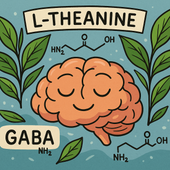
L-Theanine and GABA: Natural Calm for Parkinson’s-Related Anxiety
Anxiety in Parkinson’s often feels overwhelming — a constant inner tension that affects both body and mind. 🌿 This article explores how L-theanine and GABA, two natural compounds that promote relaxation without sedation, can help restore balance, ease restlessness, and calm the nervous system for a more peaceful state of mind. 🌙
-

Ashwagandha for Stress Relief in Parkinson’s: Can It Calm the Mind?
Ashwagandha, the ancient Ayurvedic adaptogen, may offer powerful stress relief for people with Parkinson’s. 🌿 By regulating cortisol, calming the nervous system, and supporting dopamine balance, this natural herb helps ease anxiety, improve sleep, and promote emotional stability — restoring calm from the inside out. 🌙
-
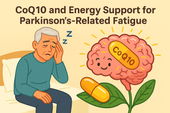
CoQ10 and Energy Support for Parkinson’s-Related Fatigue
Fatigue in Parkinson’s goes far beyond tiredness — it’s a deep cellular exhaustion. ⚡ CoQ10, a natural compound essential for energy production, may help restore vitality by supporting mitochondrial function and protecting brain cells from oxidative stress. Discover how CoQ10 can enhance energy, reduce fatigue, and improve overall resilience in Parkinson’s. 🌿
-
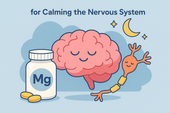
Magnesium for Calming the Nervous System in Parkinson’s
Magnesium is one of the most underrated allies for people with Parkinson’s. 🌿 This calming mineral supports the brain, relaxes tense muscles, and stabilizes the nervous system, helping reduce anxiety, restlessness, and sleep problems. Discover how magnesium nourishes dopamine pathways, protects neurons, and restores a sense of inner peace from within. 💫
-

Vitamin D and Mental Health in Parkinson’s: Why Deficiency Matters
Vitamin D is more than a sunshine nutrient — it’s a key player in brain health and emotional balance for people with Parkinson’s. 🌞 This article explores how vitamin D influences dopamine, serotonin, and inflammation, and why deficiency can worsen depression, anxiety, and cognitive decline. Discover how restoring healthy levels can bring clarity, calm, and resilience back to daily life. 🌿
-

Omega-3s and Parkinson’s: Supporting Mood and Cognitive Clarity
Omega-3 fatty acids are among the most powerful nutrients for supporting brain health and emotional well-being in people with Parkinson’s. 🧠 This article explores how omega-3s strengthen neuronal membranes, improve dopamine and serotonin signaling, reduce inflammation, and promote cognitive clarity. Learn how these essential fats can help ease anxiety, lift mood, and protect your mind from oxidative stress naturally. 🌿
-
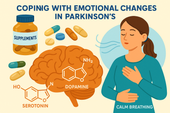
Coping with Emotional Changes in Parkinson’s: Supplements That Support Balance
Emotional changes like anxiety, depression, and irritability are common yet often overlooked symptoms of Parkinson’s disease. This article explores how supplements such as omega-3s, magnesium, and vitamin D can support mood regulation, while therapy and breathwork techniques help restore calm and emotional balance naturally. 🌿
-
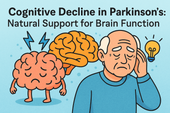
Cognitive Decline in Parkinson’s: Natural Support for Brain Function
Cognitive decline in Parkinson’s can affect memory, focus, and daily independence—but there’s hope. Understanding how the disease impacts brain chemistry opens the door to natural ways of support. From omega-3s and CoQ10 to mindfulness and exercise, you can nourish your brain, boost clarity, and slow decline through holistic care. 🌿🧠
-
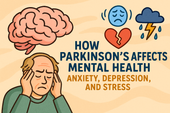
How Parkinson’s Affects Mental Health: Anxiety, Depression, and Stress
Dopamine is the brain’s spark of motivation—the chemical that fuels focus, pleasure, and drive. When dopamine levels are balanced, you feel inspired and alive; when they’re low, everything feels like an uphill climb. Understanding how dopamine works can help you support mental clarity, resilience, and emotional balance naturally. ⚡🧠
-

How Supplements Can Support Therapy and Healing from Co-Dependency
Biology is the science of life—an exploration of how cells, systems, and molecules create the foundation for every thought, emotion, and heartbeat. From the way our DNA shapes us to how hormones and neurons communicate, biology reveals the deep interconnectedness between mind and body. Understanding it helps us appreciate the delicate balance that keeps us alive, aware, and evolving. 🌿🧬
-

Creating a Supplement Stack for Emotional Independence and Balance
Biochemistry is the invisible language of life—how molecules, cells, and systems communicate to keep your body and mind in balance. From neurotransmitters shaping emotions to enzymes fueling energy, every process in your body reflects biochemical harmony. Understanding these reactions helps you see how nutrition, supplements, and emotions intertwine to support health, mood, and resilience. ⚗️🌿
-

Supplements for Supporting Emotional Healing and Self-Identity
Biology is the bridge between mind and body—the science that explains how cells, hormones, and systems communicate to sustain life. It reveals how emotional states influence physical health, and how nourishment, rest, and movement keep us in balance. Understanding biology helps us reconnect with our natural intelligence and live in harmony with ourselves and the world. 🌿🔬
-

The Role of Antioxidants in Reducing Stress Damage from Toxic Relationships
Biology is the study of life in motion—the intricate dance between cells, systems, and the natural world. From DNA replication to neurotransmitter flow, every process in the human body reflects the intelligence of life adapting and evolving. Understanding this harmony helps us appreciate how nutrition, stress, and environment shape our health and emotional balance. 🌿🔬
-

Cortisol Imbalance in Co-Dependency: How Supplements Can Help
Cortisol is the body’s main stress hormone—essential for energy and focus, yet harmful when chronically elevated. When life feels like constant pressure, cortisol imbalance can trigger fatigue, anxiety, and mood swings. Learning how to restore balance through rest, nutrition, and the right supplements can help you rebuild calm, clarity, and resilience from the inside out. 🌿💫
-

Adaptogens Like Rhodiola Rosea for Emotional Strength and Independence
Adaptogens are nature’s stress-balancing herbs—plants like Rhodiola, Ashwagandha, and Holy Basil that help your body adapt to emotional and physical pressure. They don’t numb or overstimulate; they teach your system how to find calm and stability again. By restoring balance to your hormones, energy, and mood, adaptogens nurture emotional resilience and grounded strength. 🌿✨
-

GABA and L-Theanine: Natural Calm for Boundary Setting
Anxiety can feel like a storm inside your mind—constant tension, overthinking, and the inability to relax even when you’re safe. But beneath the chaos, your body is simply trying to protect you. Learning to calm anxiety starts with understanding how your brain and nervous system respond to stress—and how to gently guide them back to peace. 🌿💫
-

How Omega-3s May Improve Emotional Regulation and Reduce Over-Attachment
Inflammation isn’t just about sore joints or fatigue—it’s also a hidden driver of mood swings, anxiety, and emotional burnout. When chronic stress or poor diet keep the body inflamed, the brain’s chemistry changes, making calm harder to access. Learning how to reduce inflammation through nutrition, rest, and mindful living helps restore balance from the inside out. 🌿💫
-

Magnesium for Calming the Nervous System in Co-Dependent Relationships
The nervous system is the body’s communication network, linking your mind and organs through a delicate web of electrical signals. It controls everything from emotional responses to muscle movement—and when it’s overwhelmed by chronic stress or anxiety, balance is lost. Learning how to calm and nourish your nervous system through nutrition, mindfulness, and rest can restore peace and emotional stability. 🌿💫
-

Ashwagandha and Co-Dependency: Supporting Stress Resilience
Stress is more than a feeling—it’s a full-body signal that your system is overwhelmed. When the mind races and the body tenses, your hormones, breathing, and focus all shift into survival mode. Chronic stress doesn’t just affect emotions—it reshapes your nervous system, drains your energy, and clouds your clarity. Learning to understand and manage stress gently is the first step toward peace, balance, and true recovery. 🌿💫
-

Why Co-Dependency Feels Draining: Adrenal Fatigue and Supplements That Help
The adrenal glands are small but powerful organs that sit above your kidneys, acting as your body’s built-in stress managers. They produce hormones like cortisol and adrenaline that help regulate energy, mood, and resilience. When they’re overworked from chronic stress or emotional exhaustion, fatigue and imbalance follow. Supporting adrenal health naturally can help restore calm, energy, and hormonal balance. 🌿⚡
-

The Link Between Anxiety, Co-Dependency, and Natural Support
Anxiety feels like living in constant alert mode—your heart races, your thoughts loop, and your body can’t find peace. It’s the nervous system’s way of preparing for danger, even when none exists. Understanding what’s happening in your mind and body is the first step toward calming the storm and restoring balance. 🌿💫
-

Supplements That Support Dopamine and Serotonin in Co-Dependent Patterns
Serotonin is the neurotransmitter of calm, confidence, and contentment. When it’s balanced, you feel peaceful and emotionally grounded. When it’s low, anxiety, mood swings, and emotional dependence take over. By understanding serotonin’s role in emotional health—and how to support it naturally—you can rebuild inner stability, improve relationships, and cultivate lasting happiness from within. 🌞💫
-

How Emotional Exhaustion in Codependency Impacts the Nervous System
The nervous system is the body’s communication network, connecting the brain to every organ and muscle. It regulates stress, mood, and emotion through a delicate balance of electrical and chemical signals. When overwhelmed, it can become dysregulated—leading to fatigue, anxiety, and emotional imbalance. Understanding how to calm and strengthen the nervous system is key to healing from chronic stress and emotional burnout. ⚡🌿
-

What Is Co-Dependency? The Role of Brain Chemistry and Stress
Stress is more than a feeling—it’s a full-body experience that begins in the brain and ripples through every cell. When cortisol surges and the nervous system stays on alert, your body can’t rest or recover. Over time, this constant tension affects energy, focus, mood, and even immune health. Understanding stress chemistry is the first step toward breaking free from burnout and finding calm again. 🌿
-

Creating a Supplement Stack for Motivation, Energy, and Anti-Procrastination
Motivation is the fuel behind every meaningful achievement—but it’s not just about willpower. It’s a mix of mindset, brain chemistry, and momentum. When energy, focus, and purpose align, action feels natural instead of forced. Learn how to harness motivation as a daily state, not a fleeting feeling.
-

Supplements for Building Consistency and Reducing Chronic Procrastination
Biochemistry is the bridge between biology and chemistry—the science of life at the molecular level. It explains how nutrients, hormones, and neurotransmitters interact to create energy, thought, and emotion. From brain function to muscle movement, biochemistry reveals the invisible processes that sustain health, balance, and vitality.
-

GABA and Procrastination: Supporting Calm Focus for Productivity
GABA is the brain’s natural calming messenger—a neurotransmitter that helps slow mental overactivity and ease stress. When GABA levels drop, focus fades, anxiety rises, and procrastination becomes more likely. By supporting GABA through nutrition, lifestyle, and supplements, you can restore calm clarity, improve focus, and take action with steady, balanced energy.
-

Ashwagandha and Procrastination: Lowering Stress to Improve Action
Science is the language of curiosity and discovery. It helps us understand the hidden patterns behind life, energy, and the universe. Through experimentation and critical thinking, science connects imagination to evidence—turning questions into knowledge. Whether through microscopes, molecules, or minds at work, science represents our endless pursuit of truth and innovation.
-

Neurotransmitters and Motivation: Supplements That Support Drive and Focus
Supplements can do more than boost physical health—they can also enhance mental clarity, focus, and motivation. Nutrients like omega-3s, magnesium, B vitamins, and adaptogens help balance neurotransmitters, stabilize mood, and support brain energy. When combined with good sleep, nutrition, and mindful habits, they can transform how your brain performs under stress.
-

How Stress Hormones Like Cortisol Fuel Procrastination (and What Helps)
Blood sugar isn’t just about physical health—it directly impacts focus, mood, and motivation. When glucose levels spike and crash, energy and attention do the same, fueling procrastination and brain fog. Learning how to stabilize blood sugar through balanced meals, mindful habits, and key nutrients helps keep your mind steady, focused, and ready to act.
-

Brain Fog and Procrastination: Supplements for Mental Clarity
Brain fog can turn even simple tasks into mental hurdles. When your thoughts feel slow and unclear, procrastination often follows—making focus and productivity seem impossible. This article explores the biochemical and lifestyle causes of brain fog and reveals the most effective supplements for restoring mental clarity, focus, and sustained energy.
-

The Link Between Low Energy and Procrastination: Can Supplements Help?
Neurochemistry shapes how we think, feel, and act. When neurotransmitters like dopamine, serotonin, and GABA fall out of balance, it can lead to fatigue, anxiety, or lack of motivation—fueling procrastination and low mood. Understanding the brain’s chemical communication system helps us find ways to restore focus, calm, and emotional stability through nutrition, mindfulness, and targeted supplements.
-

Why Do We Procrastinate? The Role of Dopamine and Supplements That Support It
Dopamine is the brain’s motivation messenger—the chemical that fuels focus, reward, and drive. When dopamine levels drop, even simple tasks can feel impossible to start. This article explores how dopamine shapes procrastination, motivation, and mental energy, along with natural supplements and daily habits that help restore balance and get things done.
-

Phosphatidylserine and Stress Reduction for People with BDD
Stress is more than a mental state—it’s a full-body experience that affects hormones, brain chemistry, and emotional balance. For people with Body Dysmorphic Disorder (BDD), constant tension and worry about appearance can overload the nervous system. Learning how stress works and finding ways to calm it is key to breaking the cycle of anxiety and self-criticism.
-

How Antioxidants Like Vitamin C & E Support Mental Health in BDD
Antioxidants are the body’s natural defense against stress and inflammation. For people with Body Dysmorphic Disorder (BDD), oxidative stress can worsen fatigue, anxiety, and emotional imbalance. Nutrients like Vitamin C and E help protect brain cells, boost neurotransmitter function, and support a calmer, clearer mindset—building a stronger foundation for recovery.
-

Ginkgo Biloba and Memory Support for BDD Recovery
Emotional regulation is the foundation of healing from Body Dysmorphic Disorder (BDD). When the nervous system stays in constant overdrive, even small stressors can trigger self-critical spirals. Learning to calm emotional reactivity helps restore clarity, confidence, and a sense of inner balance. By blending mindfulness, nervous system support, and self-compassion, you can retrain your brain to respond—not react—to emotion.
-

Alpha GPC and Cognitive Function in Body Dysmorphic Disorder
Mental fatigue can feel like your brain has hit a wall—thoughts slow down, focus fades, and motivation disappears. For people with Body Dysmorphic Disorder (BDD), chronic overthinking, emotional stress, and constant self-evaluation can deplete mental energy even further. Understanding what causes this cognitive exhaustion is the first step toward recovery—through rest, balanced nutrition, and targeted brain-supporting supplements.
-

N-Acetyl L-Tyrosine and BDD: Supporting Mental Clarity
Chronic stress doesn’t just affect your mood—it reshapes your brain chemistry, weakens focus, and fuels the obsessive thought loops common in Body Dysmorphic Disorder (BDD). Over time, constant cortisol elevation drains mental energy and emotional balance. Learning to recognize and manage chronic stress is essential to restoring mental clarity, self-compassion, and resilience.
-

Chamomile and Lavender for Calming Obsessive Body Image Thoughts
The nervous system is the command center of our emotional and physical world—and in Body Dysmorphic Disorder (BDD), it often operates in overdrive. Understanding how the brain and body communicate under stress reveals why intrusive thoughts feel uncontrollable. Learning to regulate the nervous system through calm practices, nutrition, and supplements helps restore inner balance and emotional safety.
-

Adaptogens for Body Dysmorphic Disorder: Rhodiola, Ginseng, and More
Rhodiola rosea, often called the “golden root,” is an adaptogenic herb renowned for boosting stress resilience and mental endurance. For individuals with Body Dysmorphic Disorder (BDD), Rhodiola may help reduce fatigue, regulate cortisol, and enhance emotional balance. By supporting both mind and body, this powerful plant promotes calm focus, improved mood, and renewed energy to face daily challenges.
-

B Vitamins for Stress Resilience in BDD: Rebuilding Calm from Within
Biochemistry is at the heart of every thought, emotion, and reaction we experience. In Body Dysmorphic Disorder (BDD), chemical imbalances in neurotransmitters like serotonin, dopamine, and GABA can amplify stress and distort self-perception. Understanding the biochemistry behind mood and stress regulation offers a path toward healing—bridging the gap between emotional experience and the body’s molecular balance.
-

Melatonin and Body Dysmorphic Disorder: Restoring Healthy Sleep Patterns
Melatonin, the body’s natural sleep hormone, plays a vital role in helping people with Body Dysmorphic Disorder (BDD) restore healthy sleep cycles. When anxiety and obsessive thinking interfere with rest, melatonin levels often drop, leading to more emotional reactivity and distorted self-perception. This article explores how melatonin works, why BDD disrupts it, and how natural supplementation—combined with mindful routines—can help the brain and body finally find calm at night.
-

Sleep Struggles with BDD: Supplements for Rest and Recovery
When you’re living with Body Dysmorphic Disorder (BDD), restful sleep can feel impossible—but the right supplements can help reset your body’s natural rhythm. From magnesium and L-theanine to 5-HTP and ashwagandha, these nutrients support relaxation, lower cortisol, and enhance melatonin production. This article explores how supplements can calm the mind, ease nighttime anxiety, and promote true restorative sleep for emotional and physical recovery.
-

5-HTP and Serotonin Balance: Could It Help with Body Dysmorphic Disorder?
Anxiety can feel like a storm inside the mind—restless, overwhelming, and hard to control. In people with Body Dysmorphic Disorder (BDD), anxiety often fuels obsessive thoughts and self-criticism, creating a painful cycle of worry and self-doubt. This article explores the biological roots of anxiety, the role of neurotransmitters like serotonin and GABA, and how natural strategies such as mindfulness, supplements, and nervous system regulation can restore calm and mental clarity.
-

Can Ashwagandha Help Ease Stress and Anxiety in Body Dysmorphic Disorder?
Neurotransmitters like serotonin, dopamine, GABA, and acetylcholine are the chemical messengers that shape how we think, feel, and react to stress. In Body Dysmorphic Disorder (BDD), imbalances in these neurotransmitters can amplify anxiety, obsessive thinking, and emotional distress. This article explores how restoring healthy brain chemistry through nutrition, supplements, and mindfulness can help bring clarity, calm, and emotional stability.
-

L-Theanine for BDD: Finding Calm in the Mind
Neurochemistry plays a central role in how we think, feel, and see ourselves. For those living with Body Dysmorphic Disorder (BDD), imbalances in neurotransmitters like serotonin, dopamine, and GABA can intensify anxiety, obsessive thoughts, and emotional distress. This article explores how regulating brain chemistry through supplements, mindfulness, and lifestyle changes can bring the nervous system back into harmony and restore inner calm.
-

Omega-3 Fatty Acids and Body Image Disorders: Supporting Emotional Health
Omega-3 fatty acids do far more than support heart health—they nourish the brain, stabilize mood, and may ease the emotional turbulence tied to body image disorders like BDD. This in-depth article explores how omega-3s regulate serotonin, dopamine, and inflammation, helping individuals reduce obsessive thoughts and rebuild self-acceptance. It also connects nutrition to therapy, mindfulness, and nervous system balance for holistic emotional healing.
-

Magnesium and BDD: Calming an Overactive Nervous System
Magnesium plays a crucial role in calming an overactive nervous system—something people with Body Dysmorphic Disorder (BDD) struggle with daily. This article explores how magnesium supports relaxation, emotional regulation, and stress reduction while diving into the science behind its connection to brain chemistry. It also examines how combining magnesium supplementation with therapy and breathwork can help rebalance the body’s stress response, reduce obsessive thought patterns, and promote lasting nervous system calm.
-

The Gut-Brain Axis and BDD: Why Probiotics Might Matter
The gut and brain are constantly in conversation — and that dialogue may shape how you experience Body Dysmorphic Disorder. By nurturing your microbiome with probiotics, prebiotics, and gut-healing nutrients, you can help rebalance serotonin, calm anxiety, and restore emotional stability from within 🧠🦠.

















































